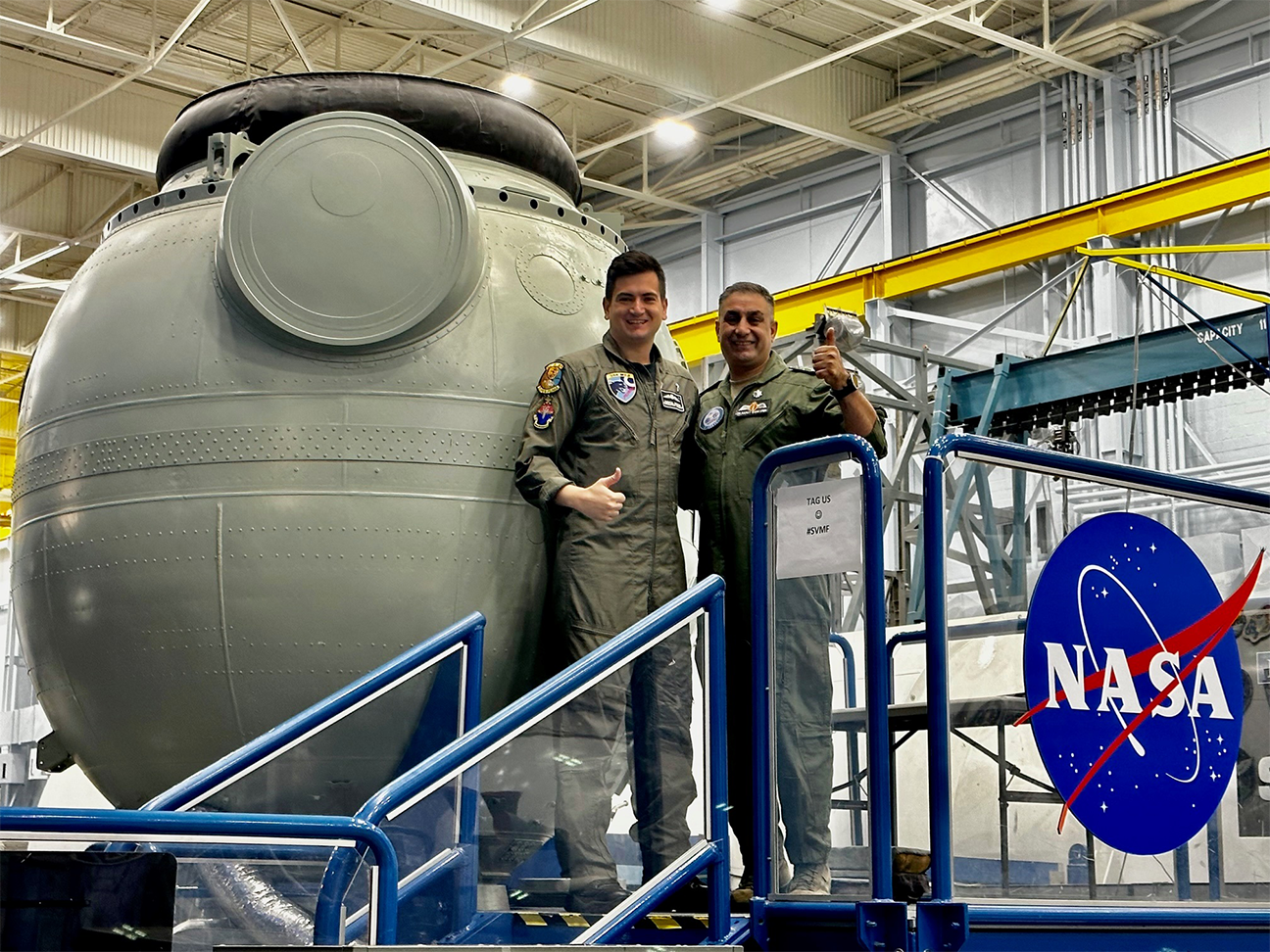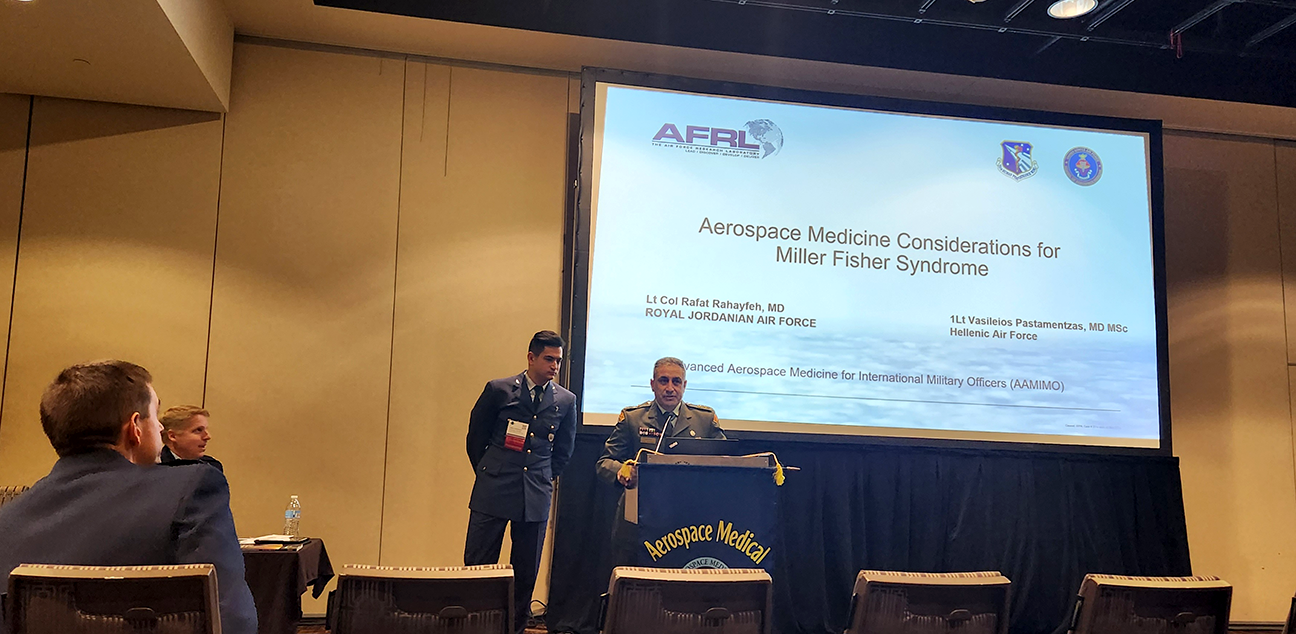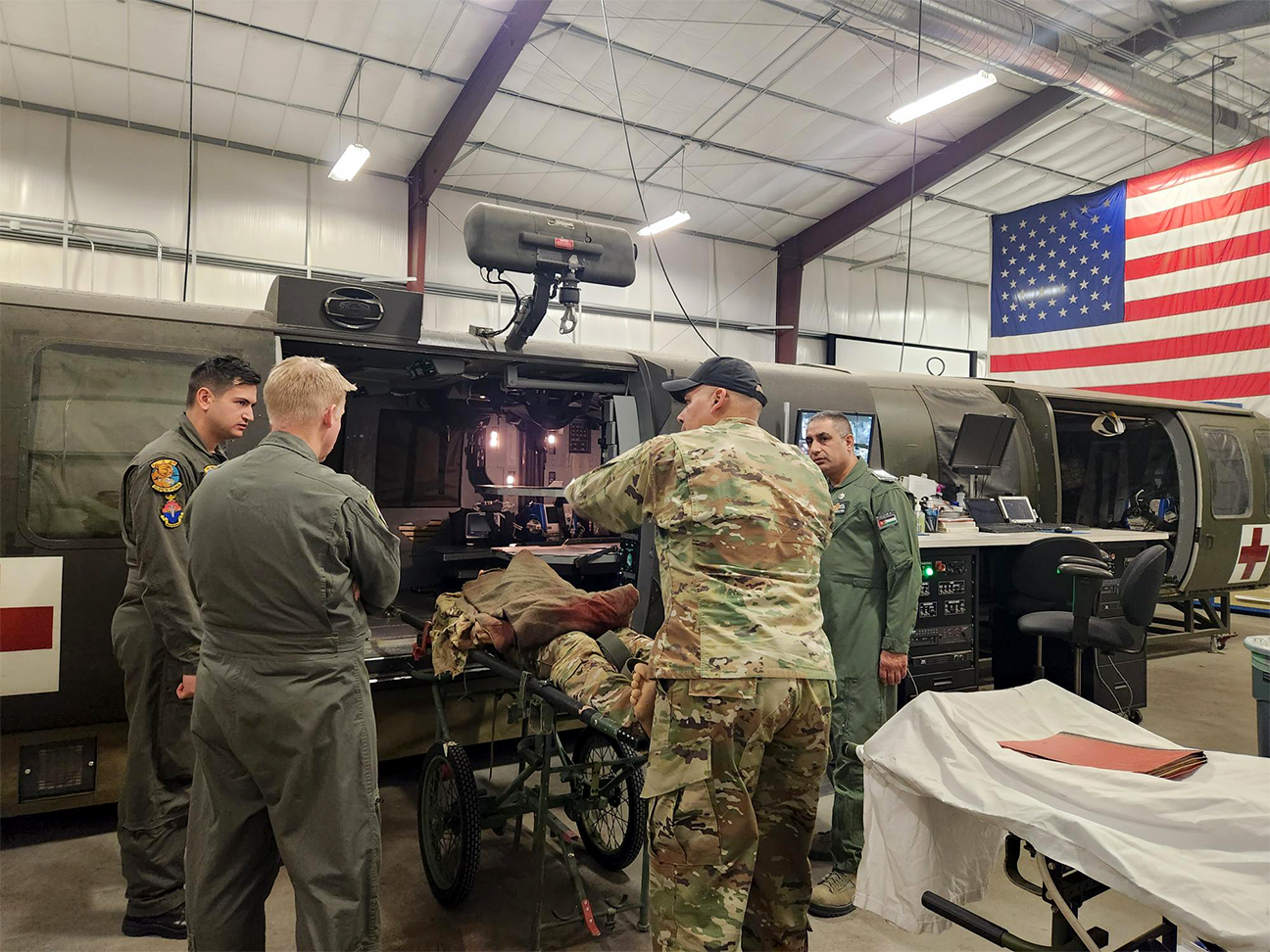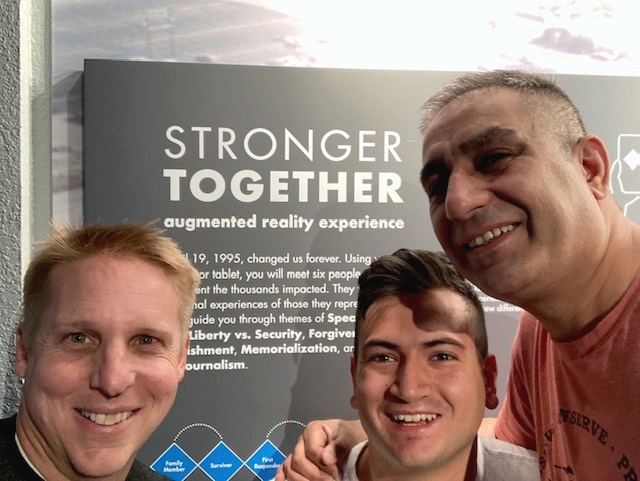Airmen strengthen medical partnerships through international education and training
FALLS CHURCH, Va. — Personnel from the U.S. Air Force School of Aerospace Medicine, or USAFSAM, are facilitating a six-month education and training course for international students, supporting medical readiness and enhanced interoperability between the United States and partners.
USAFSAM is a renowned center for aerospace medical training and education, consultation, and research. USAFSAM is developing an unmatched network of Allies and partners by training personnel from around the world. Education and training are key elements of security cooperation and is one way the Department of Defense conducts global health engagement.

Lt. Vasileios Pastamentzas, Hellenic Air Force flight surgeon, and Lt Col. Ra’fat Rahim Rahayfeh Habashneh, the Head of Aerospace Medicine for the Royal Medical Services in Jordan Armed Forces, stand in front of a Soyuz spacecraft at NASA. The two partners attended the Advanced Aerospace Medicine for International Medical Officers course. The course is a six-month education and training program for international students, which supports medical readiness and enhanced interoperability between the United States and partners. (Courtesy photo)
International students can attend the same courses as U.S. Air Force personnel, like the Aerospace Medicine Primary course or Aeromedical Evacuation training. There is also one USAFSAM course solely for international students, the Advanced Aerospace Medicine for International Medical Officers, or AAMIMO. During this six-month course, U.S. subject matter experts across multiple DoD and U.S. government agencies provide in-depth aerospace medicine training and engagement to flight surgeons from partner nations. The goal is to empower graduates to shape strategy and strengthen medical capabilities in their own nations.
The 61st iteration of the AAMIMO course is currently underway and includes students from Jordan and Greece. Lt. Col. Ra’fat Rahim Rahayfeh Habashneh and Lt. Vasileios Pastamentzas are attending their fourth month of the AAMIMO course and have traveled to eight states and Washington, D.C. so far, with official trips planned to four more states.
“My favorite part of the AAMIMO program has been traveling around the U.S., learning about the American culture and speaking with senior leaders,” said Pastamentzas, Hellenic Air Force flight surgeon.
AAMIMO students visit 26 organizations aligned with the DoD, Department of State, Federal Aviation Agency, Federal Emergency Management Agency, and NASA to maximize their experience and engage with senior leaders. Last week, they met with the Air Force’s Deputy Surgeon General, Maj. Gen. John J. DeGoes, while visiting the Pentagon. They discussed ongoing and future global health engagement initiatives between the U.S., Jordan, and Greece to increase medical readiness.
“The AAMIMO course creates a unique networking opportunity and strengthens bonds that help maximize interoperability for future operations. For these students to receive this amount of information and training in one six-month course is incomparable,” said Tech. Sgt. Sharlene Blomberg, Non-Commissioned Officer in Charge of USAFSAM’s International Training Branch.

Lt. Vasileios Pastamentzas, Hellenic Air Force flight surgeon, and Lt. Col. Ra’fat Rahim Rahayfeh Habashneh, the Head of Aerospace Medicine for the Royal Medical Services in Jordan Armed Forces, present an aeromedical case study at the Aerospace Medicine Association scientific conference in New Orleans, Louisiana. The two partners attended the Advanced Aerospace Medicine for International Medical Officers course. The course is a six-month education and training program for international students, which supports medical readiness and enhanced interoperability between the United States and partners. (Courtesy photo)
As a senior leader development course, AAMIMO enhances U.S. interests by strengthening alliances and strategic partnerships. Students who attend the AAMIMO course are hand-selected by their country based on leadership potential, and often go on to fill senior leader positions within their military.
“To have an AAMIMO alumni tell me they are now the Surgeon General or Defense Health Minister shows how these key relationships developed at USAFSAM are long-lasting and beneficial throughout the years,” said Paul McCracken, USAFSAM Chief International Military Student Officer.
According to Col. Jeffrey Harris, Chief of USAFSAM’s International Training Branch, USAFSAM creates a global network where staff, students and alumni can contact each other based on the established relationships forged during the international education and training courses.

Col. Jeffrey Harris, U.S. Air Force School of Aerospace Medicine Chief of the International Training Branch, Lt. Vasileios Pastamentzas, Hellenic Air Force flight surgeon, and Lieutenant Colonel Ra’fat Rahim Rahayfeh Habashneh, the Head of Aerospace Medicine for the Royal Medical Services in Jordan Armed Forces, load a patient onto a littler in a helicopter simulator at a Joint En-route Care Course facility at Fort Rucker, Alabama. Personnel from USAFSAM are facilitating a six-month education and training course for international students, supporting medical readiness and enhanced interoperability between the United States and partners. (Courtesy photo)
“Partners grow in their military careers and build relationships with their counterparts in the AAMIMO course they can feel comfortable reaching out to. At the recent annual Aerospace Medicine Association, or AsMA, conference in New Orleans, I met three different AAMIMO graduates: one from Korea, one from India, and one from Jordan, who had been through the course and are continuing to thrive in their military. These AAMIMO alumni are advocating for their country to consistently have students here, not just in the AAMIMO course, but in all courses,” Harris said.
Harris went on to explain that there is tremendous value in having partners in all USAFSAM education and training courses. Shared training increases cross-cultural competency and builds readiness to be able to operate together in future contingencies.
“Watching the international students speak with pride about their country to the U.S. students and seeing how quickly the U.S. students realize the importance of these relationships is the best experience. It is impactful to see the international and U.S. students embrace the partnerships,” said Blomberg.
The 2022 National Defense Strategy emphasizes the need to work seamlessly with Allies and partners across domains and regions. Training international students at USAFSAM fosters an ever-growing network of military medical personnel ready to work together, enhancing aerospace medical interoperability. The network is built on shared standards and knowledge, and also personal relationships.
“There is no shortcut for quality time with people. The international education and training courses give us that time to sit down and create lasting bonds together,” Harris said.
USAFSAM continues to expand training and education offerings for international students. The next AAMIMO course, set to begin in December 2023, is projected to have the largest number of students, signifying the value of the unique partnership opportunity.

Col. Jeffrey Harris, U.S. Air Force School of Aerospace Medicine Chief of the International Training Branch, Lt. (Dr.) Vasileios Pastamentzas, Hellenic Air Force flight surgeon, and Lt Col. (Dr.) Ra’fat Rahim Rahayfeh Habashneh, the Head of Aerospace Medicine for the Royal Medical Services in Jordan Armed Forces, engage in a cultural experience at the Oklahoma City National Memorial & Museum. Personnel from USAFSAM are facilitating a six-month education and training course for international students, supporting medical readiness and enhanced interoperability between the United States and partners. (Courtesy photo)
